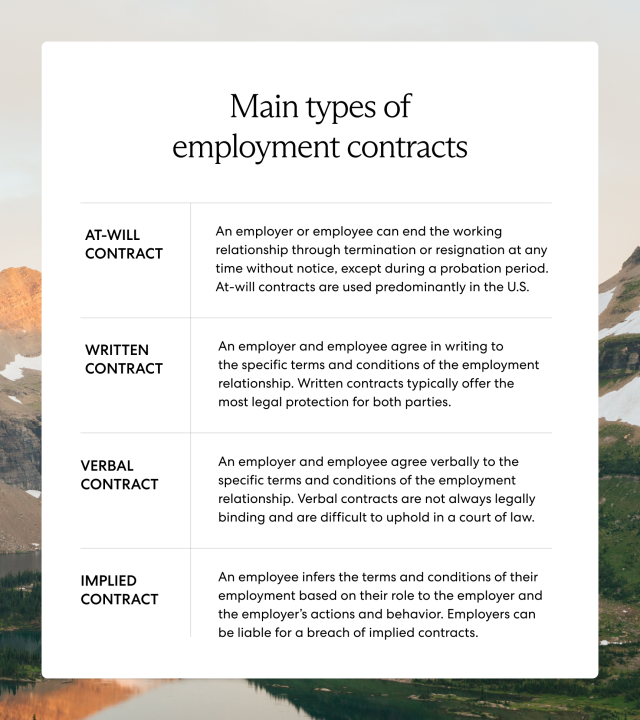Employment contracts play a significant role in creating strong employer-employee relationships. Employers worldwide use employment contracts to establish the terms of employment with their workforce and protect each other's interests and rights.
Crafting compliant employment contracts is one of the most critical aspects of hiring new employees in a foreign market. However, employment laws vary by country, and ensuring contract compliance abroad often becomes more challenging with every new global hire.
The following guide reviews the main types of employment contracts to consider when hiring talent domestically and abroad. It also provides guidance for how to mitigate employment contract noncompliance when hiring around the globe.
What is an employment contract?
An employment contract is an agreement between an employer and an employee that clearly defines the terms and conditions of the employment.
An employment contract typically clarifies things like job duties, articulates the rights and responsibilities of both parties, and ensures transparency, legal protection, and compliance with local labor laws.
Employers use employment contracts for new hires, recruits, and current employees changing job positions.
4 main types of employment contracts
There are several types of employment contracts. The contract type an HR team uses depends on the type of work the business needs and the required or preferred employee-employer relationship for the situation.
The four main types of employment contracts include the following:

At-will employment
Under at-will employment, an employee or employer can end the working relationship through termination or resignation at any time without notice—although typically not during a probation period.
While employers can terminate the employment contract for any legal reason without a notice period, employees are protected from at-will dismissal for reasons like protected classes, discrimination, or retaliation.
The United States is one of the only countries that uses at-will employment. It’s also the most common type of employment used in the U.S.
Written employment contracts
A written employment contract is a document that details the employee’s and employer’s obligations and establishes the employment to run for a specific timeframe.
Both parties agree to respect the terms and conditions of a written contract once signed. Employers typically cannot terminate employees under a written contract unless the employee violates the employment contract terms or any relevant legal provisions.
Most countries use written employment contracts. Written employment contracts are also mandatory in many countries, including the U.K., China, and New Zealand.
Verbal employment contracts
An employer and employee agree verbally to the specific terms and conditions of the employment relationship. Verbal contracts are not always legally binding and are difficult to uphold in a court of law.
A verbal employment contract is a contract created in any spoken form, such as in person or over the phone. A verbal employment contract does not appear in a written document.
Verbal contracts can be valid and legally binding if they include specific contract requirements. These requirements vary by jurisdiction, but typically a verbal contract must fulfill the same requirements fulfilled by a written contract.
For example, for a verbal employment contract to be legally binding in the U.S., it should include the following terms:
- An offer and acceptance
- Awareness by both parties
- Intention
- Consideration, such as fee for the service
- Contractual capacity that each party understands what they are doing
- Legality based on jurisdiction
Verbal employment contracts are also legally possible in certain circumstances in the U.K., Belgium, Malaysia, Spain, Sweden, Venezuela, and Vietnam.
Still, a verbal agreement may not be considered legally binding if local law states that a written agreement is required. In the U.S., these include but aren’t limited to the following:
- Real estate sales
- Contracts for selling securities, like stocks or bonds
- Agreements to pay someone else’s debts
- Contracts taking longer than one year to complete
- Contracts for selling goods over a certain monetary value, depending on the jurisdiction
Implied employment contracts
An implied employment contract is an agreement between the employer and employee based on previous interactions and general conditions of employment. An implied employment contract may combine verbal statements and written agreements developed over time.
Implied employment contracts create obligations through employer behavior and mutual trust between both parties. Factors that may contribute to implied contracts include promise of job security, labor laws, employee handbook policies, and length of employment.
Even if an employer does not formally document an implied contract, a breach of contract could still be grounds for a lawsuit.
Types of employment contracts based on duration
Employment agreements also vary based on the timing of employment established in the contract. These types of employment contracts based on duration include the following:
Indefinite employment contract
An indefinite employment contract, also called a permanent employment contract, can be used for both full-time and part-time employees and does not have a specific end date.
Under an indefinite contract, the employee agrees to work for the employer indefinitely until either party terminates the agreement. An indefinite employment contract only ends due to lawful termination, employee resignation or retirement, or events such as business closure.
Indefinite employment contracts are the most common types of employment contracts used worldwide, except the U.S., which predominantly uses at-will employment.
Indefinite employment provides guaranteed wages and benefits, offers job security, and creates financial stability for employees. Indefinite contracts also help employers retain talent, lower recruitment costs, and staff turnover, and increase employee performance and loyalty.
Limited-term employment contract
Under a limited-term or fixed-term employment contract, an employer hires an employee for a specific period. The employment agreement has established start and end dates, and the employee receives full employment benefits and rights.
Once a limited-term employment contract ends, the employer can also decide to renew or extend the contract with the employee. However, fixed-term laws vary worldwide, and many countries limit the number of times an employer can renew or extend a fixed-term contract.
Limited-term employment contracts allow employers to hire additional employees for short-term projects or when service demand is temporarily high. Companies might use limited-term employment contracts to hire seasonal workers, cover for an employee on leave, or test a new position or location.
Zero-hour employment contract
Under a zero-hour employment contract, the employer does not have to provide the employee with a minimum or guaranteed number of working hours. Also, the employee is not obligated to accept the work hours their employer offers but only receives pay for the hours they work.
Employers typically use zero-hour contracts in industries where companies experience fluctuations or seasonal changes in demand and rely on on-call scheduling, such as retail and hospitality. Zero-hour employment contracts are primarily used in the U.K. but are illegal in some countries, including New Zealand, Germany, France, and Ireland.
Zero-hour contracts offer employers flexibility and cost savings, can accommodate employees seeking flexible work schedules or supplemental income in addition to other jobs, and provide employees with minimum statutory rights.
Types of employment contracts based on talent
Employment contracts also vary based on employment status. These include the following:
Self-employment contract
Companies use self-employment contracts when engaging contractors to perform specialized work. The employer and contractor must have an established work agreement that details the project terms, contractor rate, and project details.
A contractor is not an employee of the company but rather a self-employed individual hired to perform temporary work or specialized projects. Self-employment contracts also establish the contractor’s classification, whereby they determine how, where, and when to perform the work, do not receive benefits from the employer, and pay and file their own taxes.
Learn More: Contractor vs. Employee: What’s the Difference and Which Should You Hire?
Temporary employment contract
A temporary employment contract is an agreement for a temporary employee to work for an employer for a limited time. Typically, a company works with an agency to provide temporary employees to meet staffing needs and agree to the temporary employment contract terms.
Employers often use temporary employment contracts to accommodate busy summer and holiday seasons or fill a position while a permanent employee is on vacation or maternity leave.
Temporary contracts differ from limited-term contracts in that they don’t have specified end dates. Instead, employers typically hire talent through agencies to perform temporary work for an undetermined time period. Temporary employees are also usually paid hourly versus salary.
Internship employment contract
An internship employment contract is an agreement that allows an employer to hire an intern to work on an unpaid and temporary basis. Under the contract, the intern agrees to provide their services in exchange for job training, field experience, and educational credit if they are a student.
Generally, the work done under an internship employment contract must complement and not replace a paid employee, and the agreement does not entitle the intern to permanent employment.
Apprentice agreement
Companies use an apprentice agreement when offering training opportunities for someone to sharpen or learn new skills. An apprentice agreement clarifies the apprentice’s rights and obligations, along with the training details of the skills, trade, or occupation.
An apprentice is not an employee but rather an individual engaged in learning a trade and employed for a fixed period as part of the employer’s apprenticeship program.
Achieving employment contract compliance: 5 Tips
There are many types of employment contracts, and the regulations for each vary even further when hiring employees in different countries. The following tips may help employers achieve global compliance when hiring abroad in global markets:
1. Gain a basic understanding of labor laws
Employment contract requirements vary by country. Most countries have strict employment policies and employment contract requirements, and even a minor mistake can result in fines and other penalties.
In addition to other statutory requirements, some countries require employment contracts to include workforce training and complex safety regulations. Companies should seek legal counsel or work with a global expansion partner to help draft accurate, compliant, and up-to-date employment contracts and mitigate risk.
2. Clarify the difference between contractors and employees
Companies engaging contractors risk misclassification, which occurs when an employee is incorrectly classified as a contractor due to factors such as lack of work autonomy. If an employer purposely or inadvertently misclassifies their talent, they could face liabilities, including unpaid taxes, back benefits, legal fines, and reputational damage.
Employers must clarify the difference between their employees and contractors and perform due diligence to comply with contractor employment regulations where the work is performed.
3. Align HR policies with international employment contracts
HR policies and their corresponding employment contract requirements differ in each country. As companies hire in foreign countries, HR teams must adjust their international employment contracts according to each country’s employment laws and regulations, address cultural expectations, and translate HR objectives so they are effective in global markets.
4. Include supplemental benefits in employment contracts
Companies hiring internationally often offer supplemental benefits beyond statutory compensation to attract and retain global talent. Supplemental benefits include extra earnings, perks, and incentives, such as additional health insurance, additional paid time off, and professional development stipends.
Employers must comply with local statutory requirements and research which supplemental benefits employees in the country expect and incorporate those into their global benefits packages if they want to remain competitive in the hiring market.
5. Work with a partner
One method to help ease the stress of contract compliance with global employment laws when hiring abroad is to partner with an employer or record (EOR). An EOR is well-versed in navigating the complexities of international employment laws and helps companies draft and manage compliant employment contracts so they can hire abroad with peace of mind.
An EOR also handles onboarding, payroll, benefits planning and administration, HR support, and compliance on your behalf so you can focus on growing a top-tier global team without the headache.
Learn more: What Is an Employer of Record (EOR)?
Simplify global hiring with Velocity Global
Velocity Global is a vetted and experienced EOR that has helped more than 1,000 companies compliantly employ full-time talent in over 185 countries for nearly a decade.
Discover how we make it easy to hire, pay, and manage a distributed workforce anywhere:

Or contact us today to learn how we can help you hire global talent with ease.
Legal Disclaimer: The information available in this guide does not, and is not intended to, constitute legal advice and is for general informational purposes only. You should contact your attorney to obtain legal advice with respect to any particular legal matter. Only your individual attorney can provide assurances that the information contained in this guide—and your interpretation of it—is applicable or appropriate to your particular situation. All liability with respect to actions taken or not taken based on the information in this guide is hereby expressly disclaimed. The content in this guide is provided "as is," and no representations are made that the content is error-free.
Topic:
Compliance



